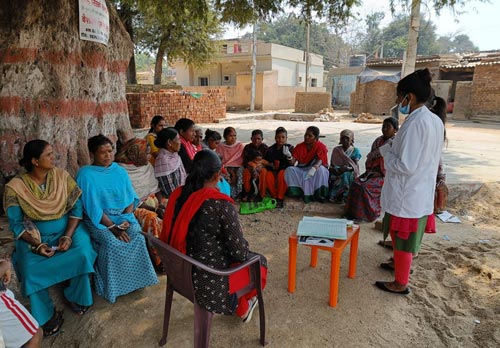World Health Day 2023: Top 3 must-know facts about breast and cervical cancer
The theme for this year is Health for All, and as India records highest breast and cervical cancer diagnoses this year than ever, especially among women, here are a few must-know facts about these types of cancers and what are the cures
 |
With India's reported cancer incidence standing at 15 lakhs and expected incidence estimated to be 1.5 to 3x higher than these reported cases, India's cancer burden is a burning issue that needs immediate attention. Today, more women than men in India are being diagnosed with cancer, reports the Indian Council of Medical Research, with breast and cervical cancer being the most common cancers amongst Indian women as per World Health Organisation.
Dr Paul Sebastian, Head, Public Health and Palliative Care, Cancer Care Programme at Tata Trusts says that What makes this more challenging is that many of the early signs and symptoms often go unnoticed as many lack awareness or choose to ignore the early signs and symptoms. The result? "Delayed detection, fewer and possibly less effective and more expensive treatment options, and a reduced chance of recovery. But it doesn't have to be this way," says Dr Sebastian adding that women need to prioritise their health and embrace self-care.
Here are three must-knows about breast and cervical cancer.
Routine screenings recommended starting at 40, followed by mammograms at 50 and above
The risk for breast cancer, which is the top cancer amongst Indian women as per Indian Council of Medical Research (ICMR) data, increases with age. "In optimum resource settings, biennial mammography screening and clinical breast examination (CBE) is recommended for women aged 50-75 years who are asymptomatic and at average risk for breast and for those aged 40-49 years, biennial CBE and mammography are recommended on the basis of risk assessment and advise of the physician," says Dr Sebastian. In low resource settings, biennial CBE is the recommended method of screening between the ages of 40-65 years.
Regular self-exams reveal a lot about your health
Self-exams to check for early signs and symptoms of breast cancer are an essential in cancer care for women of all ages. Paying attention to changes in your body to test for pain, swelling, redness, irritation, and discharge other than breast milk, is key to keeping track of these conditions. New lumps in the breasts or underarm can be a sign of breast cancer as well, and something you should watch out for proactively and regularly. "Ideally, a self-exam for breast cancer is recommended once every month, 3-5 days after the onset of your periods," says the doctor.
Certain risk factors are under your control
One's risk for breast cancer results from a combination of factors. While some factors that influence your risk levels like genetic mutations or family history of breast or ovarian cancers are beyond your locus of control, there are many risk factors that can be controlled. "Factors like being overweight or obese, taking hormones for more than five years, using certain oral contraceptives and drinking alcohol can increase your breast cancer risk. By acting with prudence and moderation in these areas of life, you can reduce your risk levels," he says. Additionally, reproductive factors like having the first pregnancy after age 30, not breastfeeding, and never having a full-term pregnancy can raise breast cancer risk – making it imperative to adopt a pragmatic approach towards parenthood for a healthy and carefree life for you and your loved ones alike," stresses the doctor.
Cervical Cancer — timely screenings, open consultations, and vaccinations key to prevention.
Women are advised to begin screening at the age of 30 years
If detected early, cervical cancer – which is the second most common cause of cancer amongst women – is highly treatable with the promise of recovery for a long and healthy life. WHO recommends starting regular cervical cancer screening by HPV DNA testing every 5-10 years starting at the age of 30 years in the general population. After the age of 50 years, screening is stopped after two consecutive negative screening results.
Certain physical symptoms can be a sign of cervical cancer
While cervical cancers do not usually show symptoms in the early stages, there are certain signs that you can watch out for. "Seemingly common symptoms that many women struggle with such as pelvic or abdominal pain, abnormal or irregular vaginal bleeding or discharge can be a sign of cervical cancer," Dr Sebastian points out. He adds, many of these symptoms could also manifest due to other unrelated underlying health concerns. "So, always consult your doctor and report any irregularities and changes during your routine check-ups."
HPV is the most common cause of cervical cancer, and preventable with a vaccine
Some types of Human Papillomavirus (HPV) cause long lasting infections, which is the main cause of cervical cancer. The good part? This common sexually transmitted virus can be prevented with HPV vaccines. With optimistic success rates, the vaccine is more than 99 per cent effective in preventing cervical cancer if administered to girls before sexual exposure between 9 to 14 years of age.
The story first appeared on: https://www.freepressjournal.in/lifestyle/world-health-day-2023-top-3-must-know-facts-about-breast-and-cervical-cancer